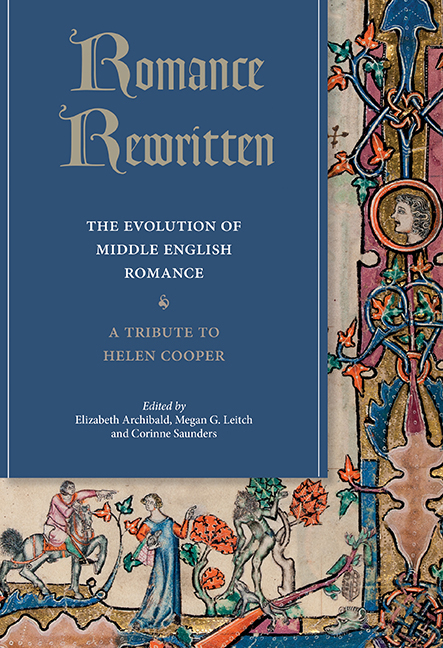Book contents
- Frontmatter
- Dedication
- Contents
- Notes on Contributors
- Acknowledgements
- Introduction. Middle English Romance: The Motifs and the Critics
- I Romance Disruptions
- II Romance and Narrative Strategies
- III Romance and Spiritual Priorities
- 8 Giving Freely in Sir Cleges: The Economy of Salvation and the Gift of Romance
- 9 From Magic to Miracle: Reframing Chevalere Assigne
- 10 Lifting the Veil: Voices, Visions, and Destiny in Malory's Morte Darthur
- IV Late Romance
- Works Cited
- Index
- Volumes Already Published
10 - Lifting the Veil: Voices, Visions, and Destiny in Malory's Morte Darthur
from III - Romance and Spiritual Priorities
Published online by Cambridge University Press: 17 October 2019
- Frontmatter
- Dedication
- Contents
- Notes on Contributors
- Acknowledgements
- Introduction. Middle English Romance: The Motifs and the Critics
- I Romance Disruptions
- II Romance and Narrative Strategies
- III Romance and Spiritual Priorities
- 8 Giving Freely in Sir Cleges: The Economy of Salvation and the Gift of Romance
- 9 From Magic to Miracle: Reframing Chevalere Assigne
- 10 Lifting the Veil: Voices, Visions, and Destiny in Malory's Morte Darthur
- IV Late Romance
- Works Cited
- Index
- Volumes Already Published
Summary
For now we see through a glass, darkly; but then face to face: now I know in part; but then shall I know even as also I am known. (1 Corinthians 13.12)
Always rewriting and always rewritten, romance also opens onto new ways of seeing. Romance retains its power in part because, in its engagement with thinking, feeling, and being in the world, it continues to allow readers to re-vision themselves. Medieval depictions of the continuum of mind and body, the role of affect in cognition, and the physical effects of love, loss, and trauma can have powerful resonances for modern readers. Recent work in ‘critical medical humanities’ emphasises the importance of a long cultural perspective, and the potential of the pre-Cartesian thought world to illuminate understandings of mind, body, and affect. Thus the Hearing the Voice project (based at Durham University and funded by the Wellcome Trust) puts past and present into conversation, bringing together researchers in humanities, social science, and science, clinicians and ‘experts by experience’ to explore the phenomenon of hearing voices without external stimuli, or ‘auditory verbal hallucinations’. Often assumed to be a symptom of psychosis, voice-hearing is also experienced by a significant proportion of the ‘healthy’ population. It may not correspond with or be satisfactorily addressed by medical diagnosis, and while often distressing, it may also be benign. Literary texts offer insights into the mental and affective processes that underpin such experiences and the ways in which individuals, communities, and cultures have made sense of them over time. The medieval thought world is one in which voice-hearing – and unusual revelatory experiences more generally – are authorised, and divine, demonic, and otherworldly forces assumed. Whereas voice-hearing has come to be privileged in the modern imagination, medieval understandings of vision were multi-sensory and voices were often only one element of visionary experience. It is in the imaginative literature of the medieval period that the intersection of internal and external forces, the intervention of the supernatural in the human world, the possibilities of hearing voices and seeing visions, and the interpretative scope of such experiences, are most fully played out.
- Type
- Chapter
- Information
- Romance RewrittenThe Evolution of Middle English Romance. A Tribute to Helen Cooper, pp. 189 - 206Publisher: Boydell & BrewerPrint publication year: 2018

